Legal Analysis of Misrepresentation and Negligence in Contract Cases
VerifiedAdded on 2021/06/18
|8
|2339
|16
Case Study
AI Summary
This case study delves into two distinct legal scenarios, analyzing the principles of misrepresentation and negligence. The first part examines a contract dispute where a party alleges misrepresentation regarding the annual profits of a restaurant, focusing on the elements required to establish misrepresentation, including false factual statements, intent to deceive, and reliance on the false information. The analysis concludes that the contract is voidable due to misrepresentation, allowing the wronged party to seek termination and damages. The second part of the study addresses a negligence claim, where consumers suffer harm after consuming contaminated cola. It explores the elements of negligence, including duty of care, breach of duty, and damages, focusing on the liability of both the retailer and the manufacturer. The analysis determines the retailer's negligence due to the contaminated product and the manufacturer's liability due to the retailer's bankruptcy, concluding that the consumer can sue the manufacturer for losses. The case study provides detailed legal reasoning and application of relevant case law to support its conclusions.
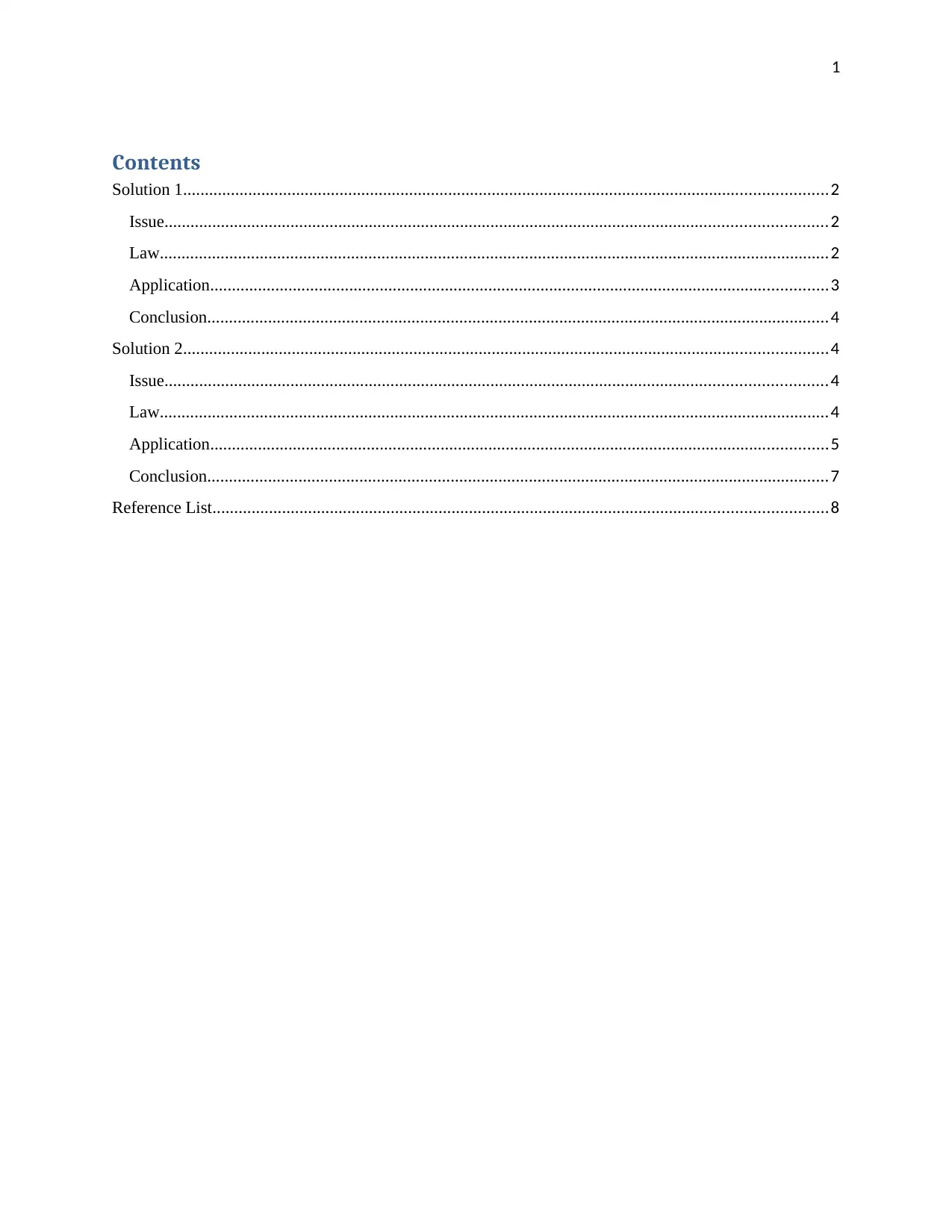
1
Contents
Solution 1....................................................................................................................................................2
Issue........................................................................................................................................................2
Law..........................................................................................................................................................2
Application..............................................................................................................................................3
Conclusion...............................................................................................................................................4
Solution 2....................................................................................................................................................4
Issue........................................................................................................................................................4
Law..........................................................................................................................................................4
Application..............................................................................................................................................5
Conclusion...............................................................................................................................................7
Reference List.............................................................................................................................................8
Contents
Solution 1....................................................................................................................................................2
Issue........................................................................................................................................................2
Law..........................................................................................................................................................2
Application..............................................................................................................................................3
Conclusion...............................................................................................................................................4
Solution 2....................................................................................................................................................4
Issue........................................................................................................................................................4
Law..........................................................................................................................................................4
Application..............................................................................................................................................5
Conclusion...............................................................................................................................................7
Reference List.............................................................................................................................................8
Paraphrase This Document
Need a fresh take? Get an instant paraphrase of this document with our AI Paraphraser
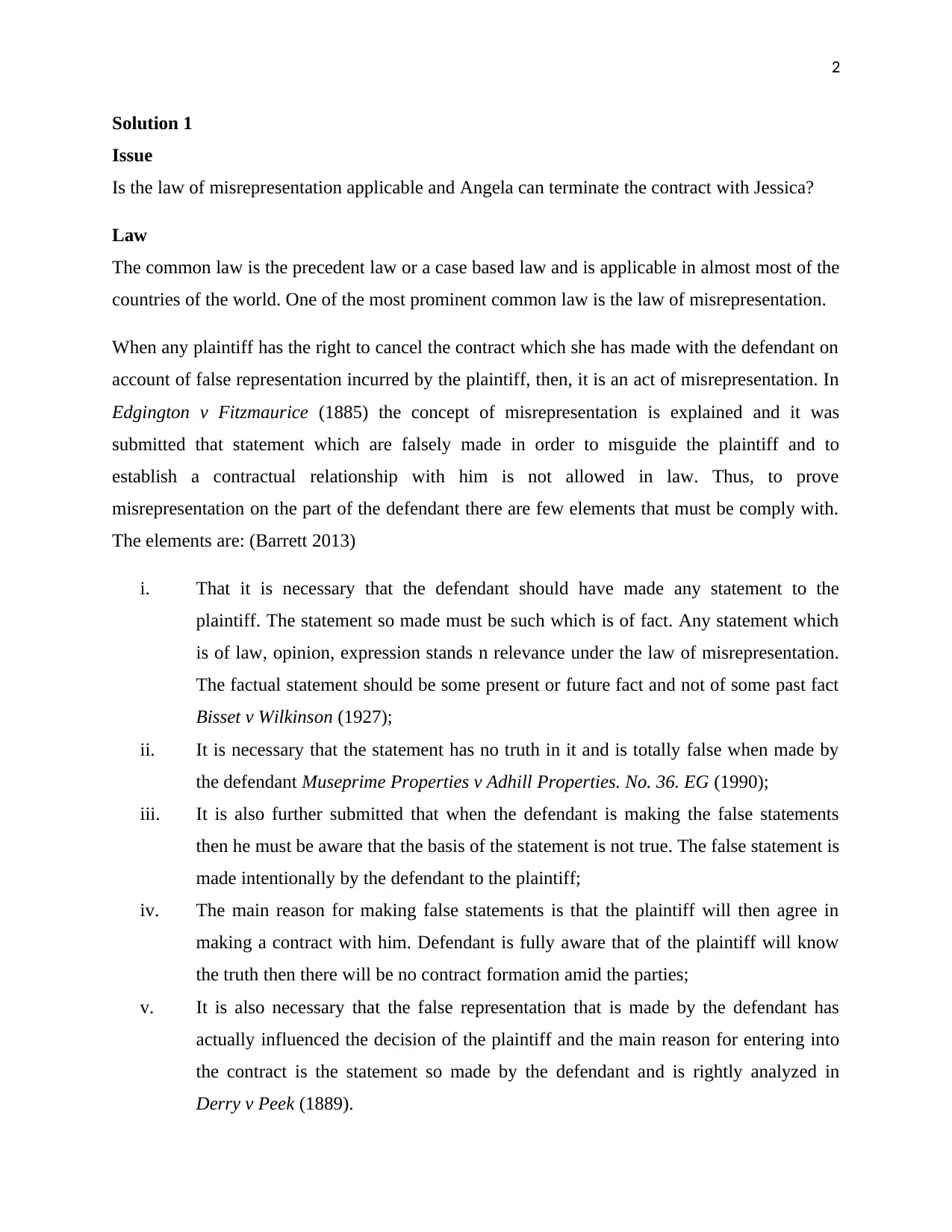
2
Solution 1
Issue
Is the law of misrepresentation applicable and Angela can terminate the contract with Jessica?
Law
The common law is the precedent law or a case based law and is applicable in almost most of the
countries of the world. One of the most prominent common law is the law of misrepresentation.
When any plaintiff has the right to cancel the contract which she has made with the defendant on
account of false representation incurred by the plaintiff, then, it is an act of misrepresentation. In
Edgington v Fitzmaurice (1885) the concept of misrepresentation is explained and it was
submitted that statement which are falsely made in order to misguide the plaintiff and to
establish a contractual relationship with him is not allowed in law. Thus, to prove
misrepresentation on the part of the defendant there are few elements that must be comply with.
The elements are: (Barrett 2013)
i. That it is necessary that the defendant should have made any statement to the
plaintiff. The statement so made must be such which is of fact. Any statement which
is of law, opinion, expression stands n relevance under the law of misrepresentation.
The factual statement should be some present or future fact and not of some past fact
Bisset v Wilkinson (1927);
ii. It is necessary that the statement has no truth in it and is totally false when made by
the defendant Museprime Properties v Adhill Properties. No. 36. EG (1990);
iii. It is also further submitted that when the defendant is making the false statements
then he must be aware that the basis of the statement is not true. The false statement is
made intentionally by the defendant to the plaintiff;
iv. The main reason for making false statements is that the plaintiff will then agree in
making a contract with him. Defendant is fully aware that of the plaintiff will know
the truth then there will be no contract formation amid the parties;
v. It is also necessary that the false representation that is made by the defendant has
actually influenced the decision of the plaintiff and the main reason for entering into
the contract is the statement so made by the defendant and is rightly analyzed in
Derry v Peek (1889).
Solution 1
Issue
Is the law of misrepresentation applicable and Angela can terminate the contract with Jessica?
Law
The common law is the precedent law or a case based law and is applicable in almost most of the
countries of the world. One of the most prominent common law is the law of misrepresentation.
When any plaintiff has the right to cancel the contract which she has made with the defendant on
account of false representation incurred by the plaintiff, then, it is an act of misrepresentation. In
Edgington v Fitzmaurice (1885) the concept of misrepresentation is explained and it was
submitted that statement which are falsely made in order to misguide the plaintiff and to
establish a contractual relationship with him is not allowed in law. Thus, to prove
misrepresentation on the part of the defendant there are few elements that must be comply with.
The elements are: (Barrett 2013)
i. That it is necessary that the defendant should have made any statement to the
plaintiff. The statement so made must be such which is of fact. Any statement which
is of law, opinion, expression stands n relevance under the law of misrepresentation.
The factual statement should be some present or future fact and not of some past fact
Bisset v Wilkinson (1927);
ii. It is necessary that the statement has no truth in it and is totally false when made by
the defendant Museprime Properties v Adhill Properties. No. 36. EG (1990);
iii. It is also further submitted that when the defendant is making the false statements
then he must be aware that the basis of the statement is not true. The false statement is
made intentionally by the defendant to the plaintiff;
iv. The main reason for making false statements is that the plaintiff will then agree in
making a contract with him. Defendant is fully aware that of the plaintiff will know
the truth then there will be no contract formation amid the parties;
v. It is also necessary that the false representation that is made by the defendant has
actually influenced the decision of the plaintiff and the main reason for entering into
the contract is the statement so made by the defendant and is rightly analyzed in
Derry v Peek (1889).
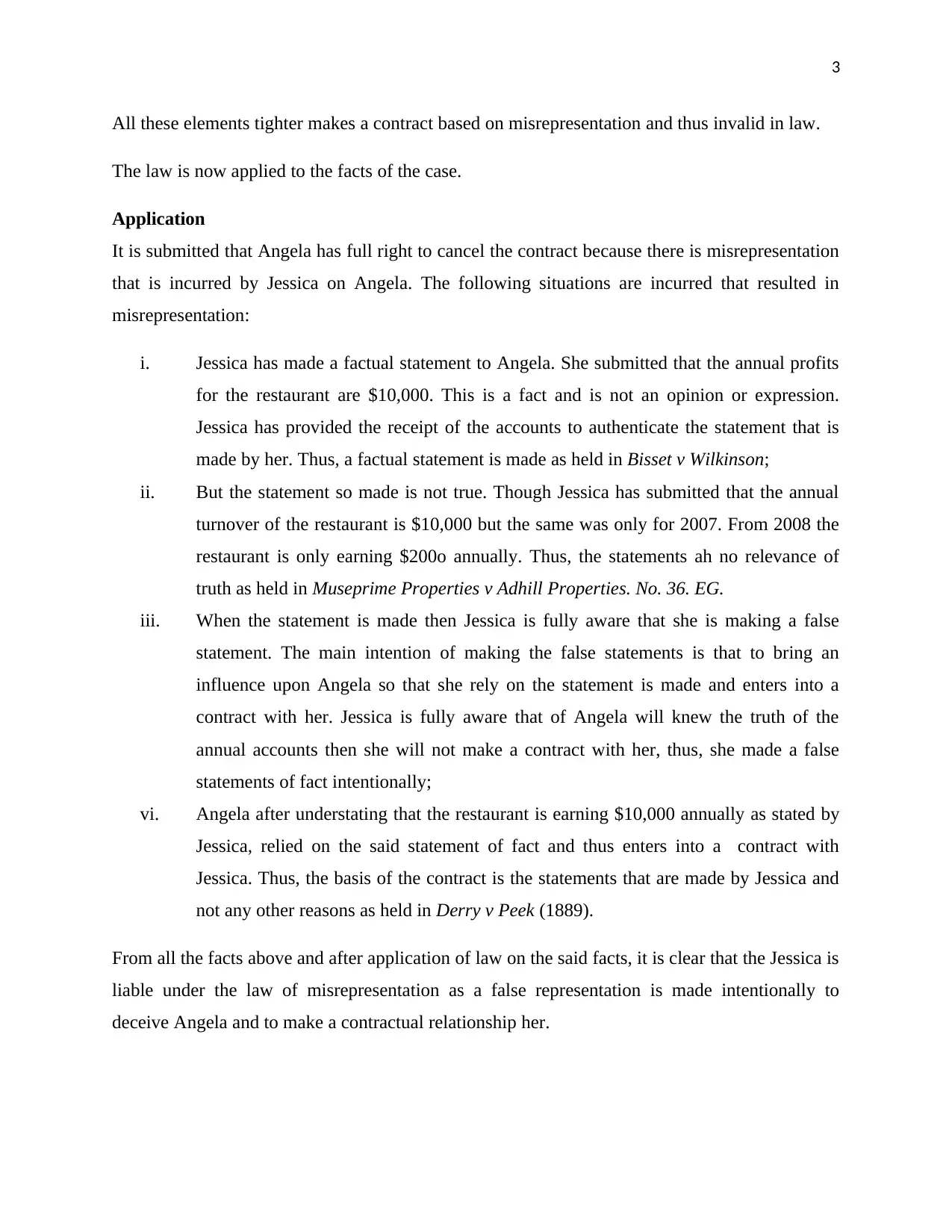
3
All these elements tighter makes a contract based on misrepresentation and thus invalid in law.
The law is now applied to the facts of the case.
Application
It is submitted that Angela has full right to cancel the contract because there is misrepresentation
that is incurred by Jessica on Angela. The following situations are incurred that resulted in
misrepresentation:
i. Jessica has made a factual statement to Angela. She submitted that the annual profits
for the restaurant are $10,000. This is a fact and is not an opinion or expression.
Jessica has provided the receipt of the accounts to authenticate the statement that is
made by her. Thus, a factual statement is made as held in Bisset v Wilkinson;
ii. But the statement so made is not true. Though Jessica has submitted that the annual
turnover of the restaurant is $10,000 but the same was only for 2007. From 2008 the
restaurant is only earning $200o annually. Thus, the statements ah no relevance of
truth as held in Museprime Properties v Adhill Properties. No. 36. EG.
iii. When the statement is made then Jessica is fully aware that she is making a false
statement. The main intention of making the false statements is that to bring an
influence upon Angela so that she rely on the statement is made and enters into a
contract with her. Jessica is fully aware that of Angela will knew the truth of the
annual accounts then she will not make a contract with her, thus, she made a false
statements of fact intentionally;
vi. Angela after understating that the restaurant is earning $10,000 annually as stated by
Jessica, relied on the said statement of fact and thus enters into a contract with
Jessica. Thus, the basis of the contract is the statements that are made by Jessica and
not any other reasons as held in Derry v Peek (1889).
From all the facts above and after application of law on the said facts, it is clear that the Jessica is
liable under the law of misrepresentation as a false representation is made intentionally to
deceive Angela and to make a contractual relationship her.
All these elements tighter makes a contract based on misrepresentation and thus invalid in law.
The law is now applied to the facts of the case.
Application
It is submitted that Angela has full right to cancel the contract because there is misrepresentation
that is incurred by Jessica on Angela. The following situations are incurred that resulted in
misrepresentation:
i. Jessica has made a factual statement to Angela. She submitted that the annual profits
for the restaurant are $10,000. This is a fact and is not an opinion or expression.
Jessica has provided the receipt of the accounts to authenticate the statement that is
made by her. Thus, a factual statement is made as held in Bisset v Wilkinson;
ii. But the statement so made is not true. Though Jessica has submitted that the annual
turnover of the restaurant is $10,000 but the same was only for 2007. From 2008 the
restaurant is only earning $200o annually. Thus, the statements ah no relevance of
truth as held in Museprime Properties v Adhill Properties. No. 36. EG.
iii. When the statement is made then Jessica is fully aware that she is making a false
statement. The main intention of making the false statements is that to bring an
influence upon Angela so that she rely on the statement is made and enters into a
contract with her. Jessica is fully aware that of Angela will knew the truth of the
annual accounts then she will not make a contract with her, thus, she made a false
statements of fact intentionally;
vi. Angela after understating that the restaurant is earning $10,000 annually as stated by
Jessica, relied on the said statement of fact and thus enters into a contract with
Jessica. Thus, the basis of the contract is the statements that are made by Jessica and
not any other reasons as held in Derry v Peek (1889).
From all the facts above and after application of law on the said facts, it is clear that the Jessica is
liable under the law of misrepresentation as a false representation is made intentionally to
deceive Angela and to make a contractual relationship her.
⊘ This is a preview!⊘
Do you want full access?
Subscribe today to unlock all pages.

Trusted by 1+ million students worldwide
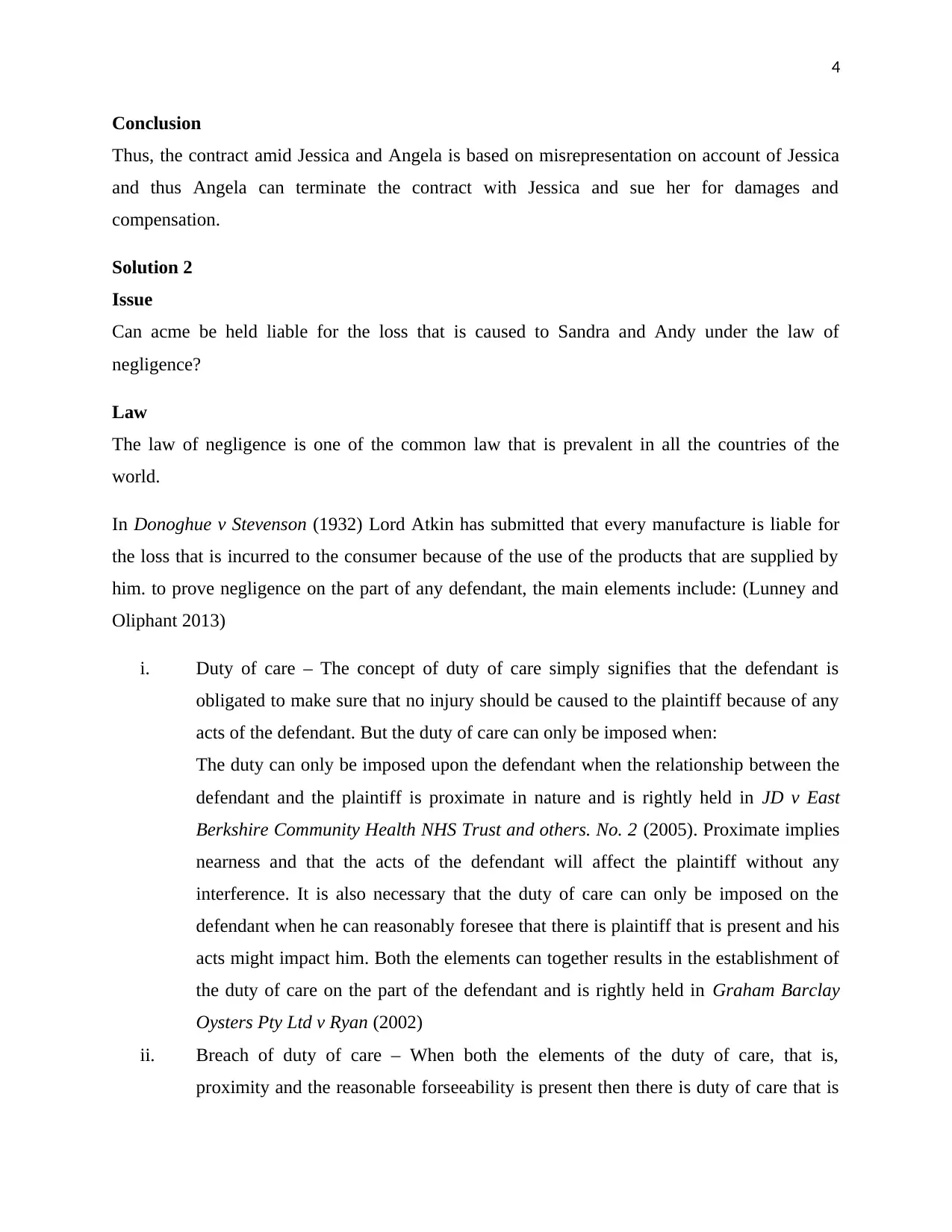
4
Conclusion
Thus, the contract amid Jessica and Angela is based on misrepresentation on account of Jessica
and thus Angela can terminate the contract with Jessica and sue her for damages and
compensation.
Solution 2
Issue
Can acme be held liable for the loss that is caused to Sandra and Andy under the law of
negligence?
Law
The law of negligence is one of the common law that is prevalent in all the countries of the
world.
In Donoghue v Stevenson (1932) Lord Atkin has submitted that every manufacture is liable for
the loss that is incurred to the consumer because of the use of the products that are supplied by
him. to prove negligence on the part of any defendant, the main elements include: (Lunney and
Oliphant 2013)
i. Duty of care – The concept of duty of care simply signifies that the defendant is
obligated to make sure that no injury should be caused to the plaintiff because of any
acts of the defendant. But the duty of care can only be imposed when:
The duty can only be imposed upon the defendant when the relationship between the
defendant and the plaintiff is proximate in nature and is rightly held in JD v East
Berkshire Community Health NHS Trust and others. No. 2 (2005). Proximate implies
nearness and that the acts of the defendant will affect the plaintiff without any
interference. It is also necessary that the duty of care can only be imposed on the
defendant when he can reasonably foresee that there is plaintiff that is present and his
acts might impact him. Both the elements can together results in the establishment of
the duty of care on the part of the defendant and is rightly held in Graham Barclay
Oysters Pty Ltd v Ryan (2002)
ii. Breach of duty of care – When both the elements of the duty of care, that is,
proximity and the reasonable forseeability is present then there is duty of care that is
Conclusion
Thus, the contract amid Jessica and Angela is based on misrepresentation on account of Jessica
and thus Angela can terminate the contract with Jessica and sue her for damages and
compensation.
Solution 2
Issue
Can acme be held liable for the loss that is caused to Sandra and Andy under the law of
negligence?
Law
The law of negligence is one of the common law that is prevalent in all the countries of the
world.
In Donoghue v Stevenson (1932) Lord Atkin has submitted that every manufacture is liable for
the loss that is incurred to the consumer because of the use of the products that are supplied by
him. to prove negligence on the part of any defendant, the main elements include: (Lunney and
Oliphant 2013)
i. Duty of care – The concept of duty of care simply signifies that the defendant is
obligated to make sure that no injury should be caused to the plaintiff because of any
acts of the defendant. But the duty of care can only be imposed when:
The duty can only be imposed upon the defendant when the relationship between the
defendant and the plaintiff is proximate in nature and is rightly held in JD v East
Berkshire Community Health NHS Trust and others. No. 2 (2005). Proximate implies
nearness and that the acts of the defendant will affect the plaintiff without any
interference. It is also necessary that the duty of care can only be imposed on the
defendant when he can reasonably foresee that there is plaintiff that is present and his
acts might impact him. Both the elements can together results in the establishment of
the duty of care on the part of the defendant and is rightly held in Graham Barclay
Oysters Pty Ltd v Ryan (2002)
ii. Breach of duty of care – When both the elements of the duty of care, that is,
proximity and the reasonable forseeability is present then there is duty of care that is
Paraphrase This Document
Need a fresh take? Get an instant paraphrase of this document with our AI Paraphraser
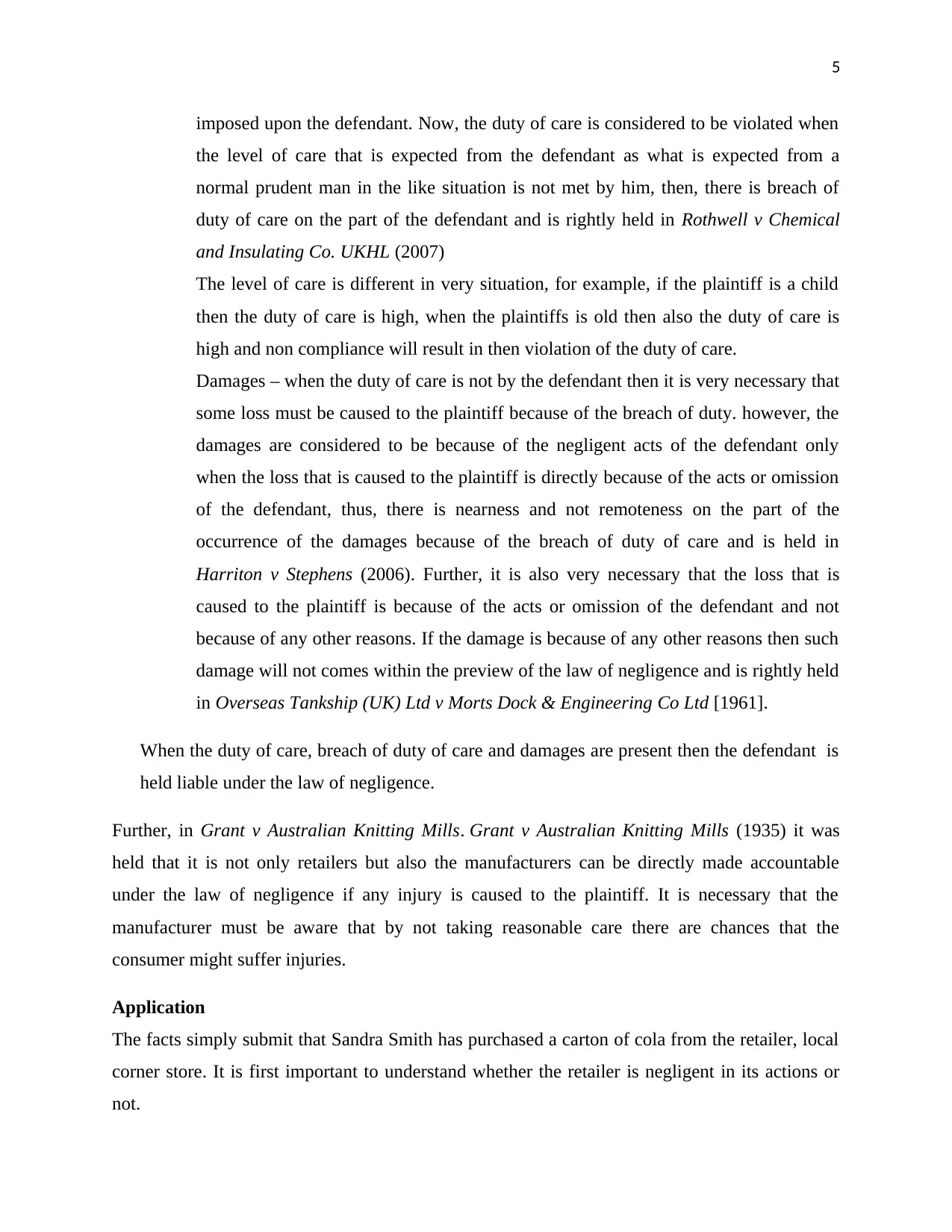
5
imposed upon the defendant. Now, the duty of care is considered to be violated when
the level of care that is expected from the defendant as what is expected from a
normal prudent man in the like situation is not met by him, then, there is breach of
duty of care on the part of the defendant and is rightly held in Rothwell v Chemical
and Insulating Co. UKHL (2007)
The level of care is different in very situation, for example, if the plaintiff is a child
then the duty of care is high, when the plaintiffs is old then also the duty of care is
high and non compliance will result in then violation of the duty of care.
Damages – when the duty of care is not by the defendant then it is very necessary that
some loss must be caused to the plaintiff because of the breach of duty. however, the
damages are considered to be because of the negligent acts of the defendant only
when the loss that is caused to the plaintiff is directly because of the acts or omission
of the defendant, thus, there is nearness and not remoteness on the part of the
occurrence of the damages because of the breach of duty of care and is held in
Harriton v Stephens (2006). Further, it is also very necessary that the loss that is
caused to the plaintiff is because of the acts or omission of the defendant and not
because of any other reasons. If the damage is because of any other reasons then such
damage will not comes within the preview of the law of negligence and is rightly held
in Overseas Tankship (UK) Ltd v Morts Dock & Engineering Co Ltd [1961].
When the duty of care, breach of duty of care and damages are present then the defendant is
held liable under the law of negligence.
Further, in Grant v Australian Knitting Mills. Grant v Australian Knitting Mills (1935) it was
held that it is not only retailers but also the manufacturers can be directly made accountable
under the law of negligence if any injury is caused to the plaintiff. It is necessary that the
manufacturer must be aware that by not taking reasonable care there are chances that the
consumer might suffer injuries.
Application
The facts simply submit that Sandra Smith has purchased a carton of cola from the retailer, local
corner store. It is first important to understand whether the retailer is negligent in its actions or
not.
imposed upon the defendant. Now, the duty of care is considered to be violated when
the level of care that is expected from the defendant as what is expected from a
normal prudent man in the like situation is not met by him, then, there is breach of
duty of care on the part of the defendant and is rightly held in Rothwell v Chemical
and Insulating Co. UKHL (2007)
The level of care is different in very situation, for example, if the plaintiff is a child
then the duty of care is high, when the plaintiffs is old then also the duty of care is
high and non compliance will result in then violation of the duty of care.
Damages – when the duty of care is not by the defendant then it is very necessary that
some loss must be caused to the plaintiff because of the breach of duty. however, the
damages are considered to be because of the negligent acts of the defendant only
when the loss that is caused to the plaintiff is directly because of the acts or omission
of the defendant, thus, there is nearness and not remoteness on the part of the
occurrence of the damages because of the breach of duty of care and is held in
Harriton v Stephens (2006). Further, it is also very necessary that the loss that is
caused to the plaintiff is because of the acts or omission of the defendant and not
because of any other reasons. If the damage is because of any other reasons then such
damage will not comes within the preview of the law of negligence and is rightly held
in Overseas Tankship (UK) Ltd v Morts Dock & Engineering Co Ltd [1961].
When the duty of care, breach of duty of care and damages are present then the defendant is
held liable under the law of negligence.
Further, in Grant v Australian Knitting Mills. Grant v Australian Knitting Mills (1935) it was
held that it is not only retailers but also the manufacturers can be directly made accountable
under the law of negligence if any injury is caused to the plaintiff. It is necessary that the
manufacturer must be aware that by not taking reasonable care there are chances that the
consumer might suffer injuries.
Application
The facts simply submit that Sandra Smith has purchased a carton of cola from the retailer, local
corner store. It is first important to understand whether the retailer is negligent in its actions or
not.
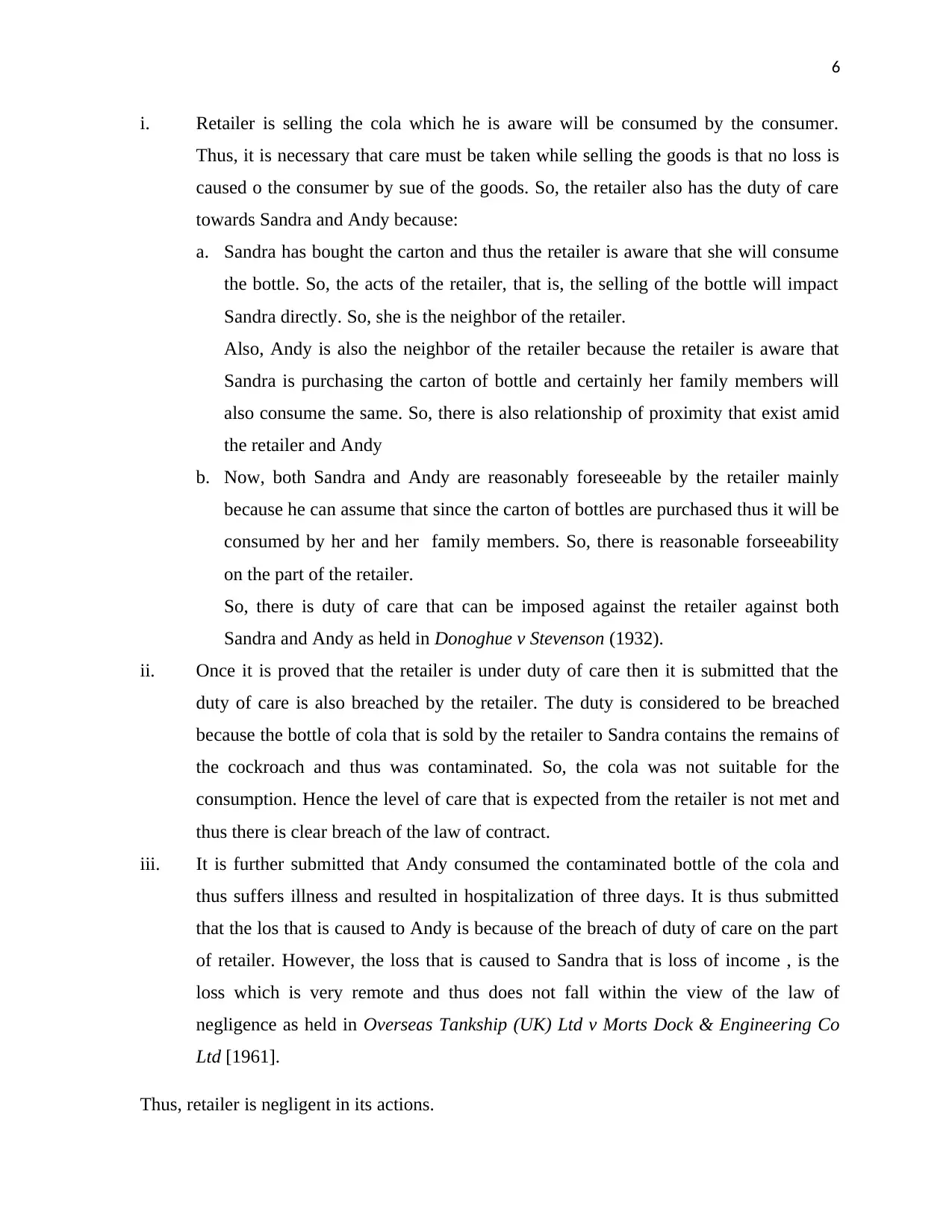
6
i. Retailer is selling the cola which he is aware will be consumed by the consumer.
Thus, it is necessary that care must be taken while selling the goods is that no loss is
caused o the consumer by sue of the goods. So, the retailer also has the duty of care
towards Sandra and Andy because:
a. Sandra has bought the carton and thus the retailer is aware that she will consume
the bottle. So, the acts of the retailer, that is, the selling of the bottle will impact
Sandra directly. So, she is the neighbor of the retailer.
Also, Andy is also the neighbor of the retailer because the retailer is aware that
Sandra is purchasing the carton of bottle and certainly her family members will
also consume the same. So, there is also relationship of proximity that exist amid
the retailer and Andy
b. Now, both Sandra and Andy are reasonably foreseeable by the retailer mainly
because he can assume that since the carton of bottles are purchased thus it will be
consumed by her and her family members. So, there is reasonable forseeability
on the part of the retailer.
So, there is duty of care that can be imposed against the retailer against both
Sandra and Andy as held in Donoghue v Stevenson (1932).
ii. Once it is proved that the retailer is under duty of care then it is submitted that the
duty of care is also breached by the retailer. The duty is considered to be breached
because the bottle of cola that is sold by the retailer to Sandra contains the remains of
the cockroach and thus was contaminated. So, the cola was not suitable for the
consumption. Hence the level of care that is expected from the retailer is not met and
thus there is clear breach of the law of contract.
iii. It is further submitted that Andy consumed the contaminated bottle of the cola and
thus suffers illness and resulted in hospitalization of three days. It is thus submitted
that the los that is caused to Andy is because of the breach of duty of care on the part
of retailer. However, the loss that is caused to Sandra that is loss of income , is the
loss which is very remote and thus does not fall within the view of the law of
negligence as held in Overseas Tankship (UK) Ltd v Morts Dock & Engineering Co
Ltd [1961].
Thus, retailer is negligent in its actions.
i. Retailer is selling the cola which he is aware will be consumed by the consumer.
Thus, it is necessary that care must be taken while selling the goods is that no loss is
caused o the consumer by sue of the goods. So, the retailer also has the duty of care
towards Sandra and Andy because:
a. Sandra has bought the carton and thus the retailer is aware that she will consume
the bottle. So, the acts of the retailer, that is, the selling of the bottle will impact
Sandra directly. So, she is the neighbor of the retailer.
Also, Andy is also the neighbor of the retailer because the retailer is aware that
Sandra is purchasing the carton of bottle and certainly her family members will
also consume the same. So, there is also relationship of proximity that exist amid
the retailer and Andy
b. Now, both Sandra and Andy are reasonably foreseeable by the retailer mainly
because he can assume that since the carton of bottles are purchased thus it will be
consumed by her and her family members. So, there is reasonable forseeability
on the part of the retailer.
So, there is duty of care that can be imposed against the retailer against both
Sandra and Andy as held in Donoghue v Stevenson (1932).
ii. Once it is proved that the retailer is under duty of care then it is submitted that the
duty of care is also breached by the retailer. The duty is considered to be breached
because the bottle of cola that is sold by the retailer to Sandra contains the remains of
the cockroach and thus was contaminated. So, the cola was not suitable for the
consumption. Hence the level of care that is expected from the retailer is not met and
thus there is clear breach of the law of contract.
iii. It is further submitted that Andy consumed the contaminated bottle of the cola and
thus suffers illness and resulted in hospitalization of three days. It is thus submitted
that the los that is caused to Andy is because of the breach of duty of care on the part
of retailer. However, the loss that is caused to Sandra that is loss of income , is the
loss which is very remote and thus does not fall within the view of the law of
negligence as held in Overseas Tankship (UK) Ltd v Morts Dock & Engineering Co
Ltd [1961].
Thus, retailer is negligent in its actions.
⊘ This is a preview!⊘
Do you want full access?
Subscribe today to unlock all pages.

Trusted by 1+ million students worldwide
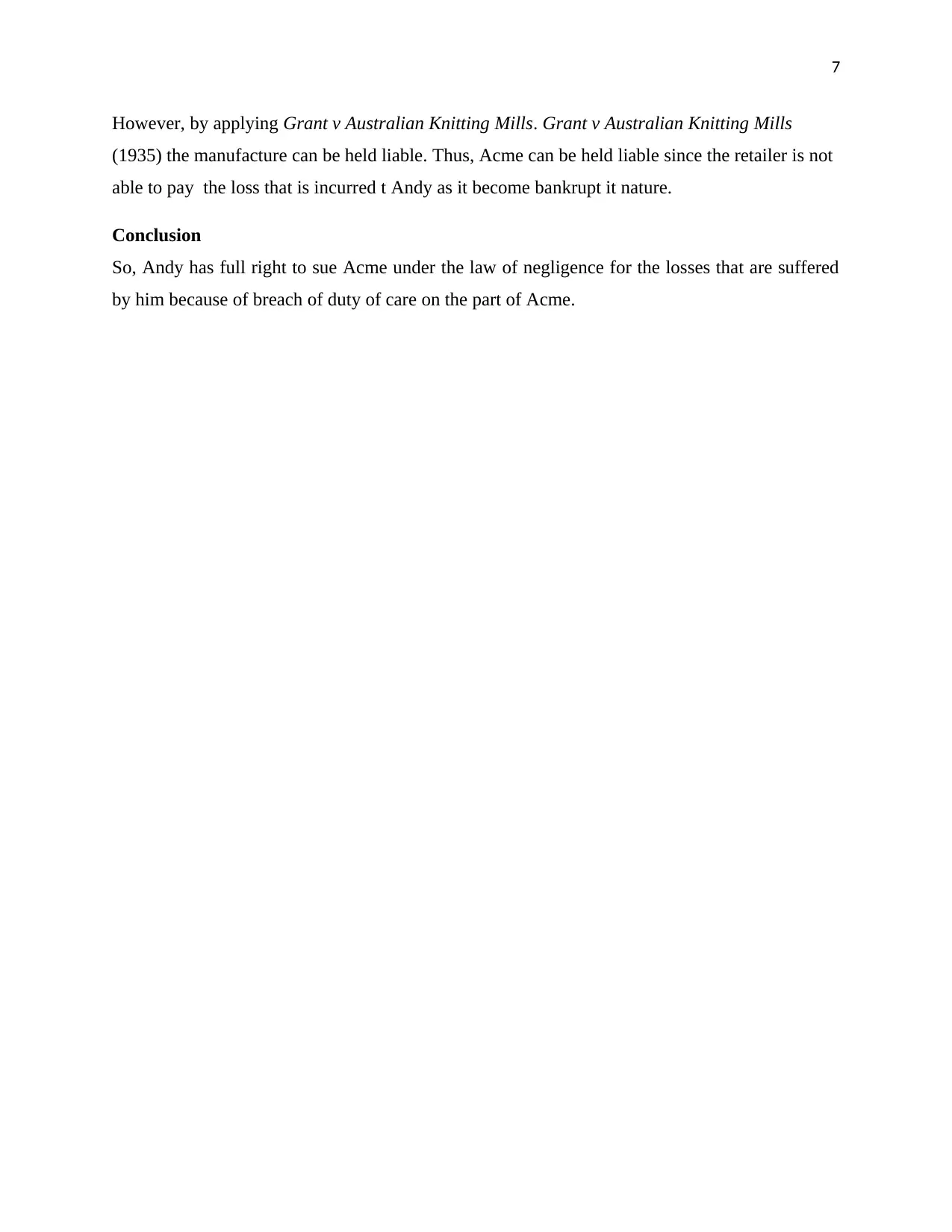
7
However, by applying Grant v Australian Knitting Mills. Grant v Australian Knitting Mills
(1935) the manufacture can be held liable. Thus, Acme can be held liable since the retailer is not
able to pay the loss that is incurred t Andy as it become bankrupt it nature.
Conclusion
So, Andy has full right to sue Acme under the law of negligence for the losses that are suffered
by him because of breach of duty of care on the part of Acme.
However, by applying Grant v Australian Knitting Mills. Grant v Australian Knitting Mills
(1935) the manufacture can be held liable. Thus, Acme can be held liable since the retailer is not
able to pay the loss that is incurred t Andy as it become bankrupt it nature.
Conclusion
So, Andy has full right to sue Acme under the law of negligence for the losses that are suffered
by him because of breach of duty of care on the part of Acme.
Paraphrase This Document
Need a fresh take? Get an instant paraphrase of this document with our AI Paraphraser
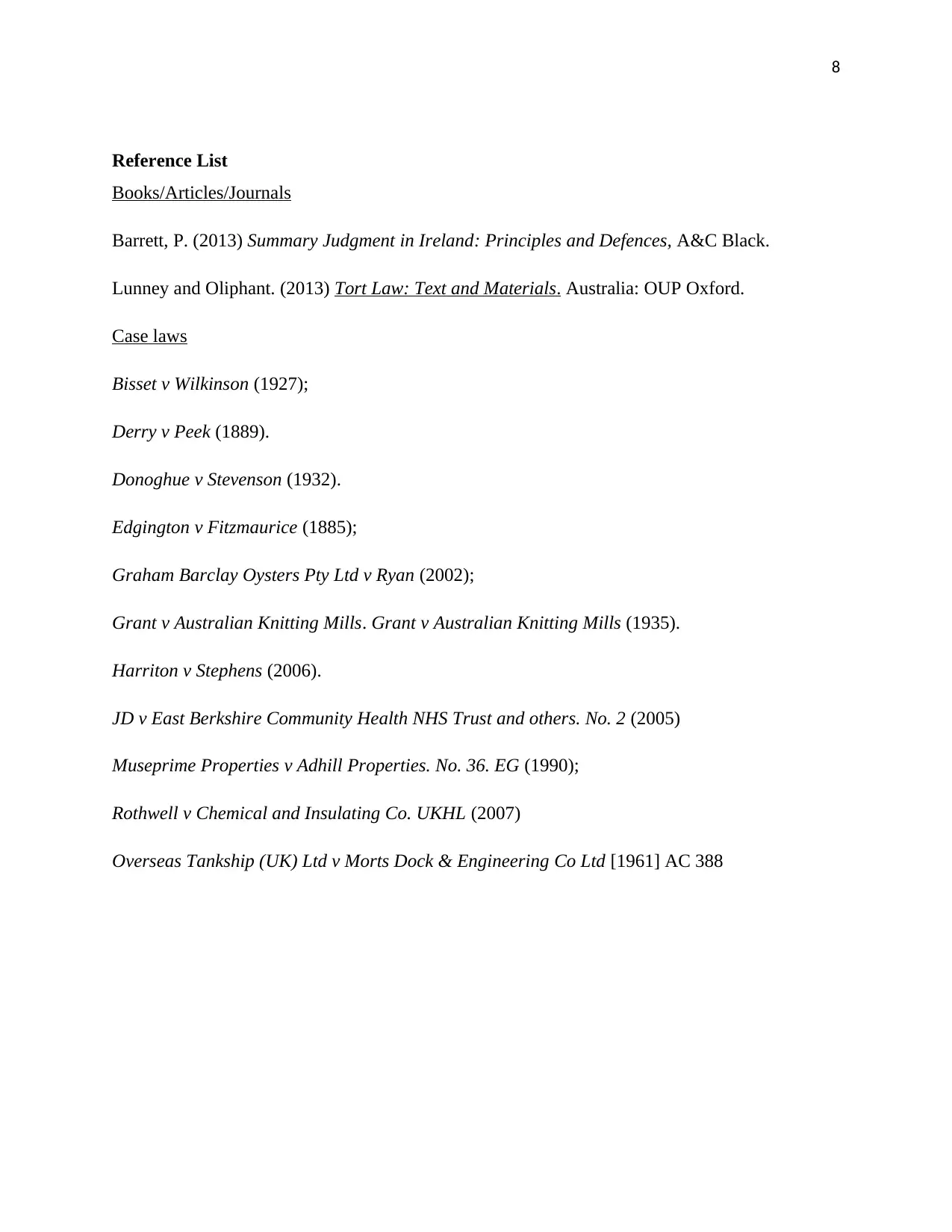
8
Reference List
Books/Articles/Journals
Barrett, P. (2013) Summary Judgment in Ireland: Principles and Defences, A&C Black.
Lunney and Oliphant. (2013) Tort Law: Text and Materials. Australia: OUP Oxford.
Case laws
Bisset v Wilkinson (1927);
Derry v Peek (1889).
Donoghue v Stevenson (1932).
Edgington v Fitzmaurice (1885);
Graham Barclay Oysters Pty Ltd v Ryan (2002);
Grant v Australian Knitting Mills. Grant v Australian Knitting Mills (1935).
Harriton v Stephens (2006).
JD v East Berkshire Community Health NHS Trust and others. No. 2 (2005)
Museprime Properties v Adhill Properties. No. 36. EG (1990);
Rothwell v Chemical and Insulating Co. UKHL (2007)
Overseas Tankship (UK) Ltd v Morts Dock & Engineering Co Ltd [1961] AC 388
Reference List
Books/Articles/Journals
Barrett, P. (2013) Summary Judgment in Ireland: Principles and Defences, A&C Black.
Lunney and Oliphant. (2013) Tort Law: Text and Materials. Australia: OUP Oxford.
Case laws
Bisset v Wilkinson (1927);
Derry v Peek (1889).
Donoghue v Stevenson (1932).
Edgington v Fitzmaurice (1885);
Graham Barclay Oysters Pty Ltd v Ryan (2002);
Grant v Australian Knitting Mills. Grant v Australian Knitting Mills (1935).
Harriton v Stephens (2006).
JD v East Berkshire Community Health NHS Trust and others. No. 2 (2005)
Museprime Properties v Adhill Properties. No. 36. EG (1990);
Rothwell v Chemical and Insulating Co. UKHL (2007)
Overseas Tankship (UK) Ltd v Morts Dock & Engineering Co Ltd [1961] AC 388
1 out of 8
Related Documents
Your All-in-One AI-Powered Toolkit for Academic Success.
+13062052269
info@desklib.com
Available 24*7 on WhatsApp / Email
![[object Object]](/_next/static/media/star-bottom.7253800d.svg)
Unlock your academic potential
Copyright © 2020–2026 A2Z Services. All Rights Reserved. Developed and managed by ZUCOL.





